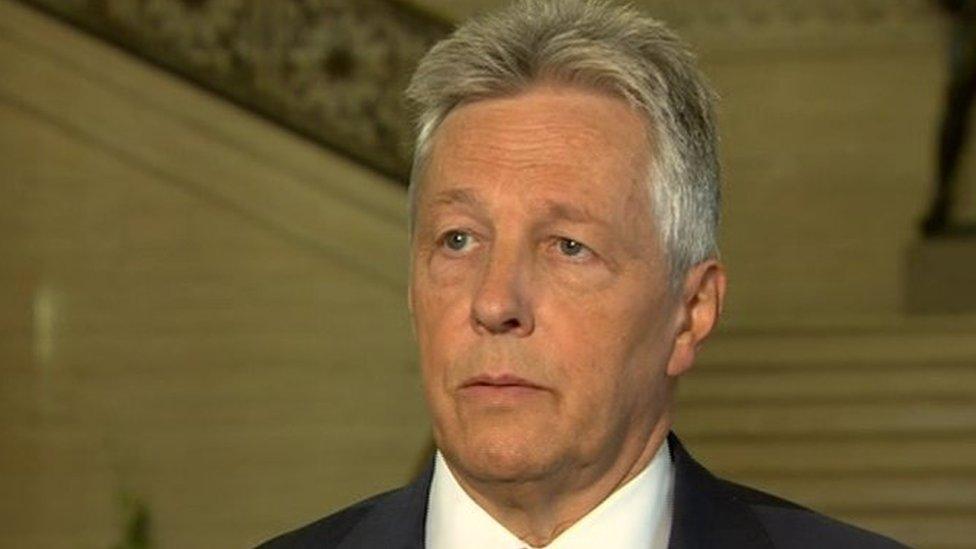Peter Robinson: Northern Ireland first minister says the time is right to quit
- Published
- comments
Mr Robinson spoke to BBC Northern Ireland's political editor Mark Devenport about the timing of his announcement.
Peter Robinson has said he decided to quit as Northern Ireland first minister and Democratic Unionist Party (DUP) leader after "stabilising" Stormont.
He told the BBC it was " difficult" to find the right time to step down, but following this week's political deal, now seemed "the appropriate time".
"You never really get the end of a chapter," Mr Robinson said.
"Probably what we have at this present time, with the agreement being reached, is as close as you're going to get."
'Rigorous and brutal'
The 66-year-old, who negotiated Tuesday's A Fresh Start , externalagreement with Sinn Féin, is set to retire from both of his roles within weeks.
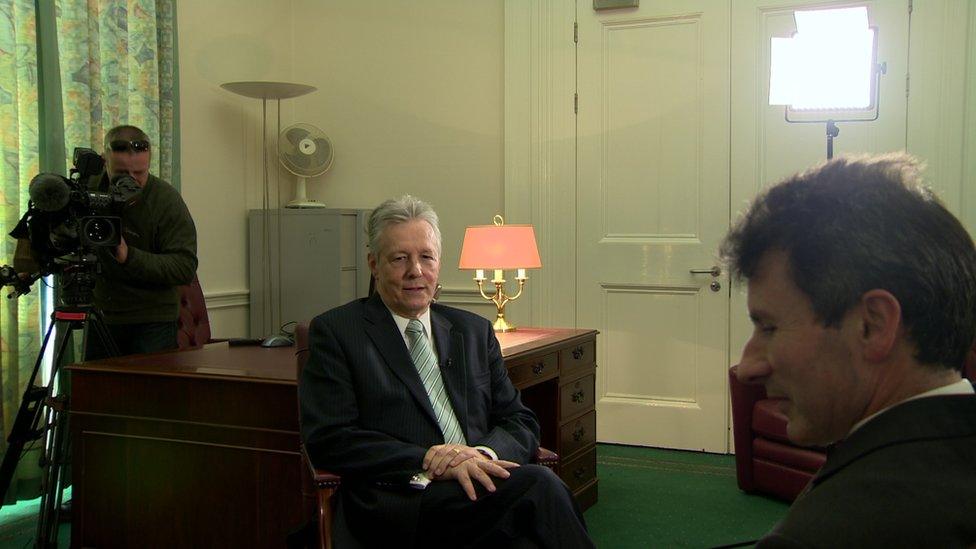
Peter Robinson told BBC NI Political Editor Mark Devenport he was planning to have some "me time" when he retires
He suffered a heart attack in May, but told the BBC his health problems were not a factor in his decision, as it happened after he had already informed his DUP colleagues that he was planning to step down.
"Right back from the Westminster election in May, I indicated to party officers that they had to factor into their calculations that I would not be standing at the next assembly elections, so they could do their forward planning," Mr Robinson said.
"But the assembly was in some disarray at that time, and the view was I should remain and attempt to stabilise the assembly and executive.
"We've done that successfully, so now it seems to me the appropriate time to announce the departure and allow the party to take it forward."
BBC News's Ireland correspondent Chris Buckler reflects on Peter Robinson's political career
Earlier, in an interview with the Belfast Telegraph, external, he said there are "massive pressures" involved in his work.
Speaking to the BBC about his heart attack, the outgoing first minister said: "If it had happened before, it may well have been one of the factors I would have taken into consideration.
"The job is an exacting job, it is rigorous and, at times, brutal."
After leaving hospital in May, Mr Robinson said his health problems were the result of his poor diet and lack of exercise, rather than his job.
But now looking forward to his retirement, he told the BBC "It's remarkable just how quickly, even after a heart attack, you can slide back into the same old habits of staying up late at night, not getting your sleep, not eating properly or getting any exercise.
"The family at least will be pleased that I'm going to be having some 'me time'."
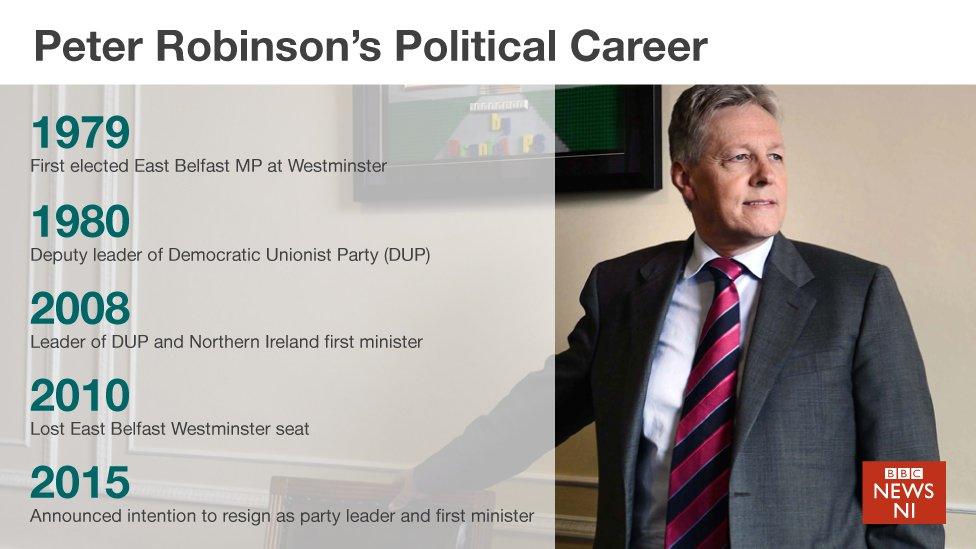
Mr Robinson is one of the founding members of the DUP and has had a political career lasting more than 40 years.
He took over as first minister and DUP leader from Ian Paisley in 2008.
Read more: Peter Robinson - a life in Northern Ireland politics
The party will hold its annual conference this weekend, and Mr Robinson said it would be "disrespectful" to members to give the impression he would be leading them into the next Northern Ireland Assembly election, set for May 2016.
On Wednesday, Mr Robinson and Deputy First Minister Martin McGuinness announced they had struck a political deal with the British and Irish governments to end a near-three-month crisis at Stormont.
That deal included an agreement on the devolution of corporation tax powers to Northern Ireland's ruling executive, which had been a long-term target for Mr Robinson.
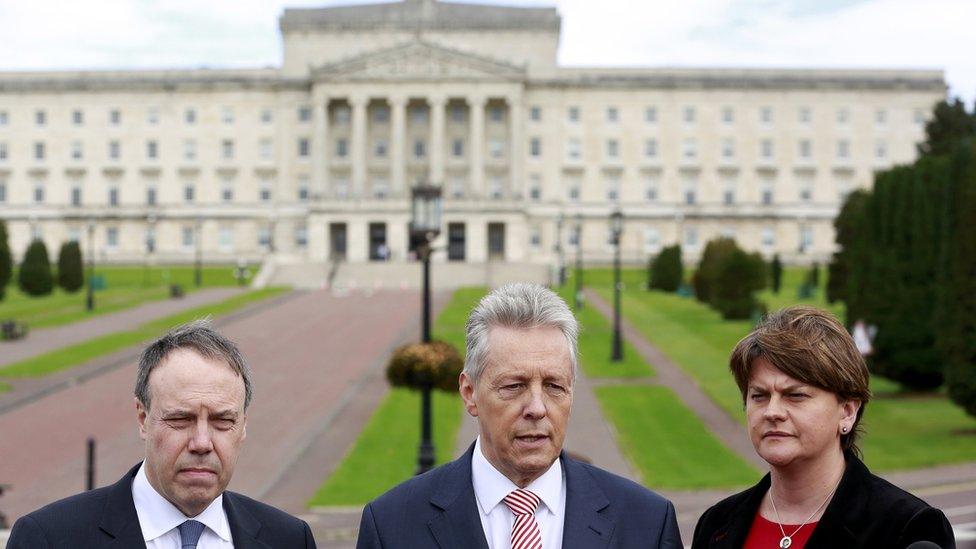
Many DUP members expect Nigel Dodds (left) and Arlene Foster (right) to succeed Peter Robinson
Mr McGuinness said he considered Mr Robinson to be a friend, and added they had a "good working relationship" during more than seven years of leading the executive together.
"We've managed to do what a previous administration under both the SDLP and Ulster Unionists couldn't do - they collapsed on three occasions and we have never collapsed.

BBC News NI political correspondent Gareth Gordon
In politics - as in other walks of life - it pays to trust your instincts.
In 2010, Peter Robinson's instincts told him not to stand in the general election. He ignored them - and lost.
It was a mistake he was unlikely to make again when it came to his other jobs as first minister of Northern Ireland and leader of the Democratic Unionist Party (DUP).

"That's a pretty incredible achievement given that we're talking about the DUP and Sinn Féin.
"I will remember him as the man who was the key architect, along with Ian Paisley, in bringing the DUP into the [Northern Ireland political] institutions."
Successors
Northern Ireland Secretary Theresa Villiers said Mr Robinson had been a "central figure" in politics for more than four decades.
"He has championed the interests of Northern Ireland with unparalleled effectiveness, determination and dedication," she said.
Deputy First Minister Martin McGuinness says it's important to recognise the contribution Peter Robinson made to bringing the DUP into an "inclusive executive".
"Peter was key to the agreement reached this week and he can be rightly proud of his contribution."
Lord Morrow, the DUP chairman, said Mr Robinson had been the "tactician behind all of the major advances" made by the party in the last 15 years.
"He has led our party and our country through some of the most delicate and difficult phases of the political process," Lord Morrow added.
"There were times when lesser men would have given up and simply walked away, but Peter endured and has worked hard for the people of Northern Ireland."
Enormity
Mr Robinson suggested in the interview that two separate successors could take on his roles.
Many within the DUP expect North Belfast MP Nigel Dodds to become party leader and Arlene Foster, the current finance minister, to become first minister.
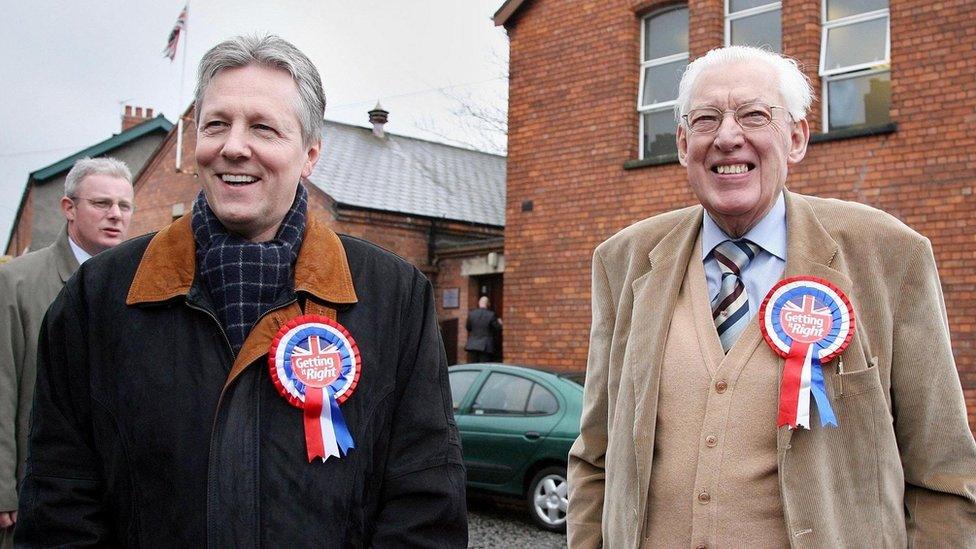
Peter Robinson helped Ian Paisley found the DUP but their relationship deteriorated in later years
Mr Dodds said Mr Robinson had been a "towering figure" in the party since its foundation who had made "huge personal sacrifices in the service of others".
"Mere words cannot convey the enormity of the thanks owed to Peter by the DUP and by everyone who values progress in Northern Ireland," he said
"He has dedicated his life to the defence of the union and to building a better life for our people."
Goodbye
Liam Clarke, the Belfast Telegraph's political editor, who spoke to the first minister, said Mr Robinson had wanted to "make a good legacy".
"The party officers have asked him to remain on until the assembly is on a firm footing, which he reckons will probably be the new year," he said.
"He wants to complete a few little things, but he's not talking about a really long goodbye."
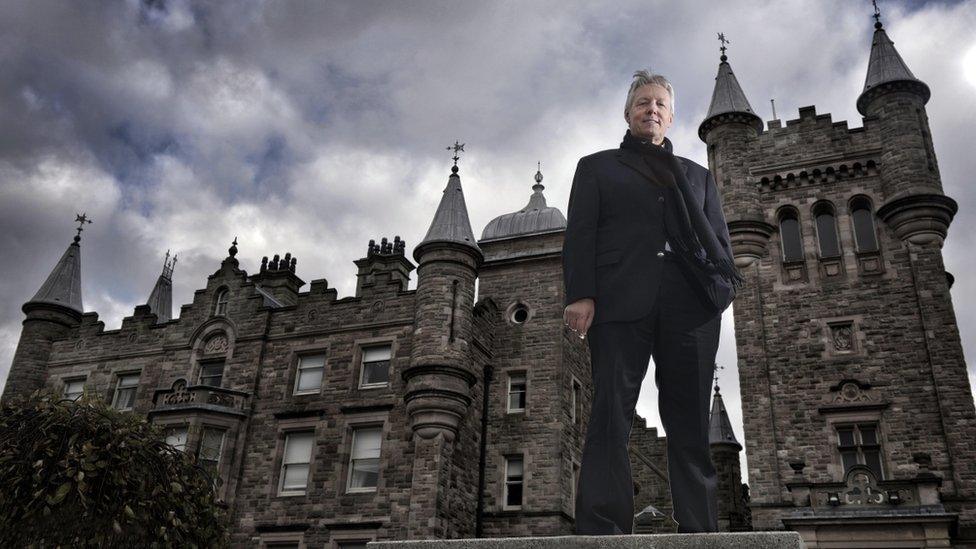
Peter Robinson had been a "towering figure" in the DUP, according to Nigel Dodds
Alliance Party leader David Ford, said Mr Robinson's decision to step aside had been "the worst-kept secret in politics".
"He has played a very significant part in Northern Ireland politics," he said.
"In the early years, some of us thought that was fairly detrimental - in recent years he's been more positive.
"We will see over the coming months exactly what [Mr Robinson's] legacy will be."
Modernised
Jim Allister, a former DUP MEP who broke away from the party to form the Traditional Unionist Voice, said Mr Robinson was "undoubtedly quite tetchy and doesn't like being challenged".
"But it would be churlish not to say that he has been a good politician," Mr Allister added.
Prof Jon Tonge, who co-authored a major academic study on the DUP, said Mr Robinson was leaving with a "strong track record" having "modernised" the party.
He added: "There's a significant legacy there and there are no big wins ahead, so it's a logical time to stand down."
- Published19 November 2015
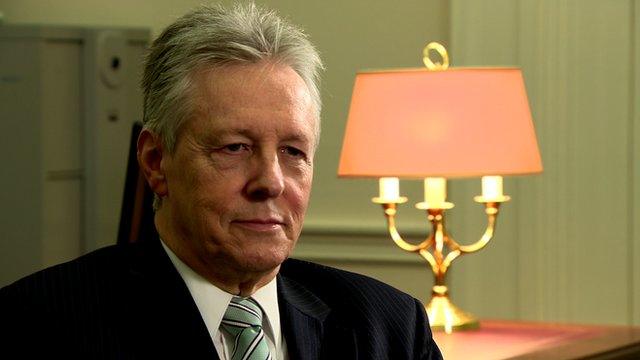
- Published19 November 2015
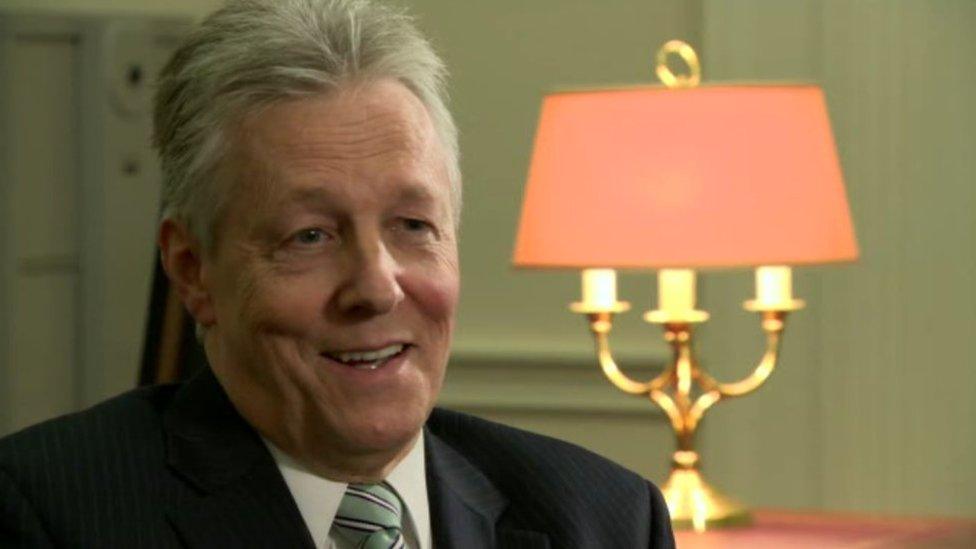
- Published19 November 2015
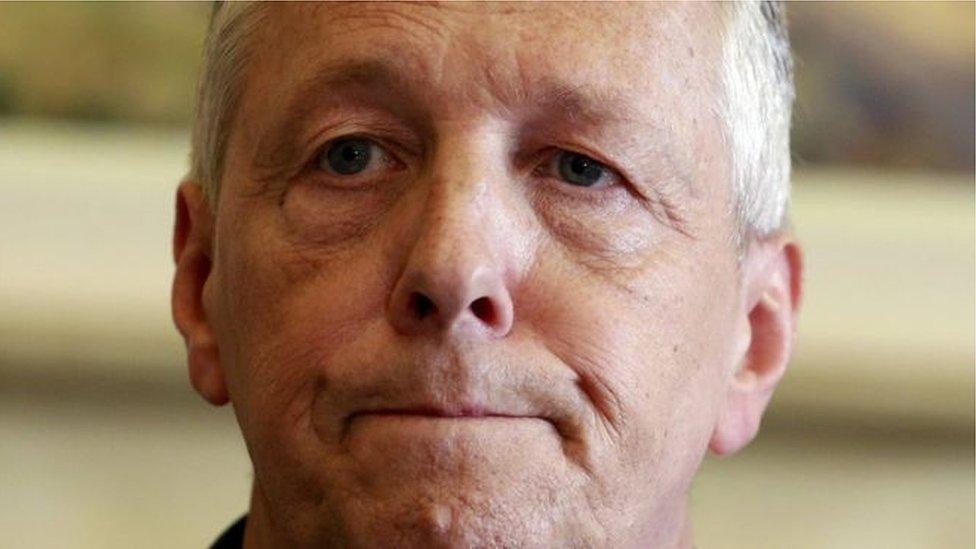
- Published19 November 2015
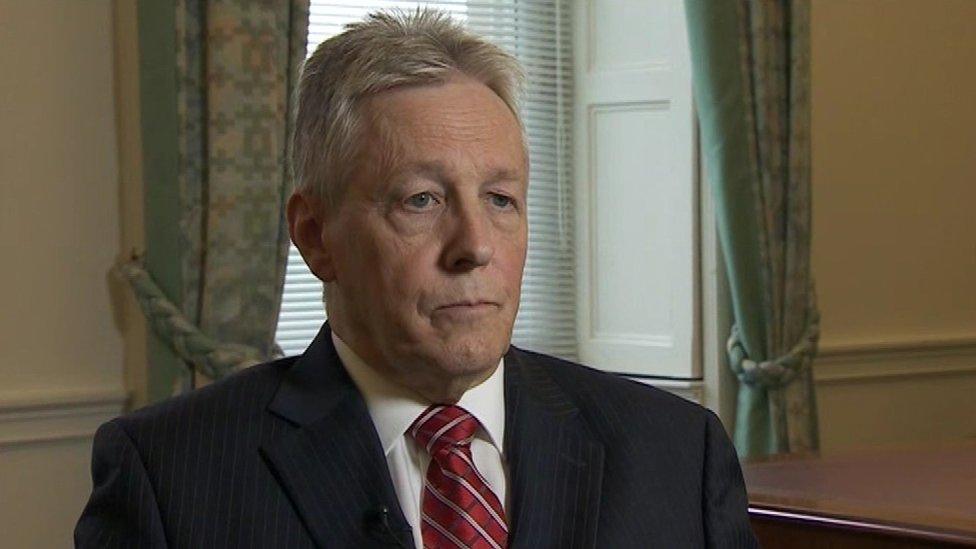
- Published19 November 2015
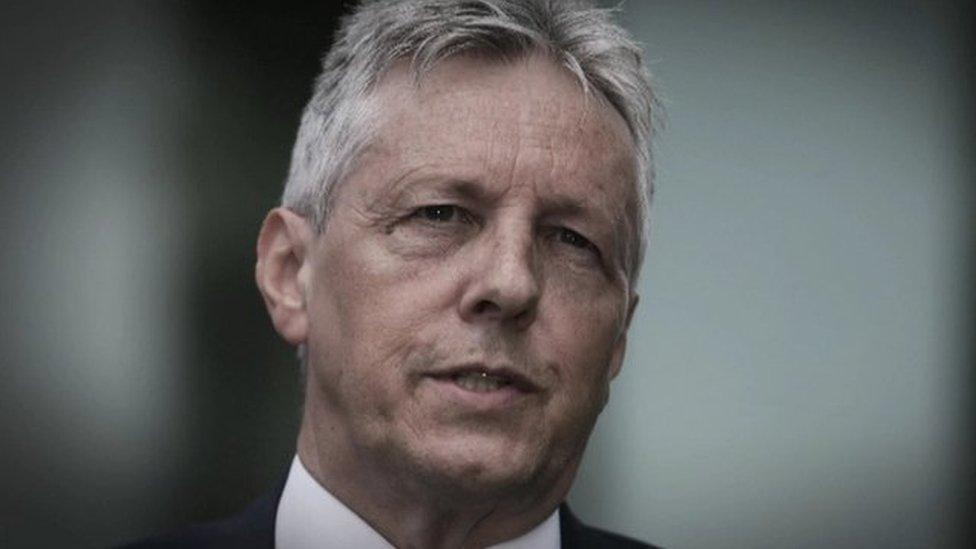
- Published19 November 2015
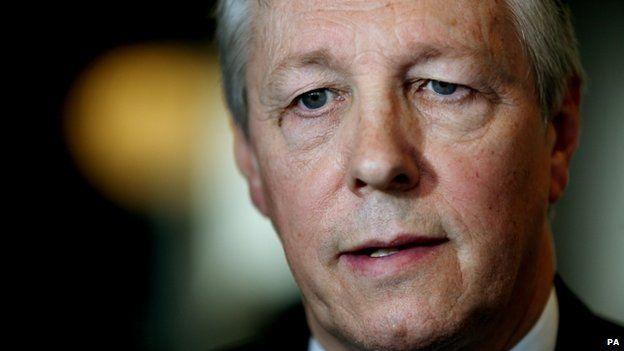
- Published19 November 2015
